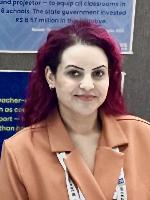

Event Information
My research follows a sociocultural perspective on education, emphasizing the role of teacher agency and professional development in adapting to educational reforms. It is grounded in the theoretical frameworks of teacher change and pedagogical adaptation, particularly in the context of integrating educational technology into teaching practices.
Additionally, my study draws on the Technological Pedagogical Content Knowledge (TPACK) framework, which highlights the intersection of technology, pedagogy, and subject content knowledge as essential for effective digital integration in the classroom. The research also considers teacher professional identity theories to understand how educators perceive and navigate the shifts imposed by the New Brazilian High School Reform.
By combining these perspectives, my research aims to explore the barriers and enablers of meaningful technology use in teaching, linking policy, professional training, and classroom practice to ensure a holistic understanding of the challenges educators face.
My doctoral research revealed that, despite investments in technology and teacher training, many educators still struggle to effectively integrate digital tools into their teaching practices. Through document analysis, classroom observations, surveys, and interviews conducted in a public school in Brazil, I identified key challenges preventing meaningful technology adoption.
Building on these findings, my Google Innovator Project seeks to bridge the gap between training and real-world classroom implementation. I am currently developing practical solutions, including personalized teacher support, training resources, and easy-to-apply strategies to help educators overcome these barriers. The next phase involves testing these solutions with teachers to assess their feasibility and impact.
This project aligns with global educational challenges, addressing how to move beyond training sessions and ensure that technology is effectively used to enhance learning. By combining research-based insights with hands-on implementation, my goal is to create a scalable and replicable approach that empowers teachers and improves student learning experiences.
My research is still in progress, and final results are not yet available. However, preliminary findings indicate that, despite government investments in technology and teacher training, many educators struggle to effectively integrate digital tools into their teaching practices. Data collected through document analysis, surveys, interviews, and classroom observations suggest that teachers often lack personalized support, practical implementation strategies, and ongoing mentorship to bridge the gap between training and real-world application.
Based on these insights, my Google Innovator Project is currently in the solution development phase, where I am designing practical resources, coaching strategies, and structured training materials to help teachers confidently integrate technology into their classrooms. The next step involves piloting these solutions with a group of teachers in a public school to evaluate their effectiveness and refine the approach before broader implementation.
While the study is ongoing, the project is well-structured and progressing according to plan. The research is designed to provide scalable and replicable strategies for supporting teachers in overcoming digital integration challenges, with the potential to inform teacher training programs, educational leadership strategies, and instructional coaching models.
The educational significance of this study lies in its focus on bridging the gap between policy, training, and real-world classroom practice. While substantial investments have been made in educational technology and teacher training, many educators struggle to effectively implement digital tools in their teaching. My research investigates these challenges and develops practical, research-based solutions to support teachers in meaningful technology integration.
For the ISTELive'25 audience—composed of educators, instructional coaches, and educational leaders—this study provides actionable insights on how to move beyond training sessions and create sustainable, scalable strategies for technology adoption in schools. By addressing teacher autonomy, personalized support, and effective digital pedagogy, my work aligns with ISTE standards and offers concrete examples of how professional development programs can be more impactful.
This research is valuable to those looking to enhance teacher training models, develop mentoring programs, or design policies that lead to real change in technology integration. It contributes not only to academic discussions but also to practical implementation strategies that can directly improve teaching and learning experiences worldwide.
Brasil. (2017). Lei nº 13.415, de 16 de fevereiro de 2017. Altera a Lei nº 9.394, de 20 de dezembro de 1996, que estabelece as diretrizes e bases da educação nacional. Diário Oficial da União, Brasília, 17 fev. 2017.
Conselho Nacional de Educação (CNE). (2018). Parecer CNE/CP nº 22/2018. Brasília, DF.
Ferreira, J. S., & Henrique, J. (2016). Modelos de formação continuada de professores: transitando entre o tradicional e o inovador nos macrocampos das práticas formativas. Cadernos de Pesquisa, 23(3), 1-15. https://periodicoseletronicos.ufma.br/index.php/cadernosdepesquisa/article/view/5795
Fullan, M., & Langworthy, M. (2014). A rich seam: How new pedagogies find deep learning. Pearson.
Google for Education. (n.d.). Certified Coach Program. https://edu.google.com/intl/ALL_br/for-educators/certification-programs/professional-expertise/certified-coach/?modal_active=none
Instituto Nacional de Estudos e Pesquisas Educacionais Anísio Teixeira (INEP). (2023). Censo Escolar 2023. Brasília. https://www.gov.br/inep/
International Society for Technology in Education (ISTE). (2017). ISTE Standards for Educators, Coaches, and Education Leaders. https://www.iste.org/
Mishra, P., & Koehler, M. J. (2006). Technological Pedagogical Content Knowledge: A framework for integrating technology in teacher knowledge. Teachers College Record, 108(6), 1017–1054.
Organização das Nações Unidas para a Educação, a Ciência e a Cultura (UNESCO). (2011). Protótipos curriculares de ensino médio e ensino médio integrado: Resumo executivo. Brasília. https://unesdoc.unesco.org/ark:/48223/pf0000192271?posInSet=1&queryId=d3491252-954c-427b-8624-542a54ddf1c6
Organização das Nações Unidas para a Educação, a Ciência e a Cultura (UNESCO). (2022). Comissão Internacional sobre os Futuros da Educação. Reimaginar nossos futuros juntos: um novo contrato social para a educação.Brasília: UNESCO; Boadilla del Monte: Fundación SM. https://unesdoc.unesco.org/ark:/48223/pf0000381115?posInSet=2&queryId=d6637e1a-699f-471b-b1ee-7ff87dbb1671
Organização das Nações Unidas para a Educação, a Ciência e a Cultura (UNESCO). (2023). Pesquisa sobre o Novo Ensino Médio. https://www.unesco.org/pt/articles/pesquisa-novo-ensino-medio
Santa Catarina. (2023). Novo Ensino Médio. Secretaria de Estado da Educação de Santa Catarina. https://www.sed.sc.gov.br/etapas-e-modalidades-de-ensino/novo-ensino-medio
